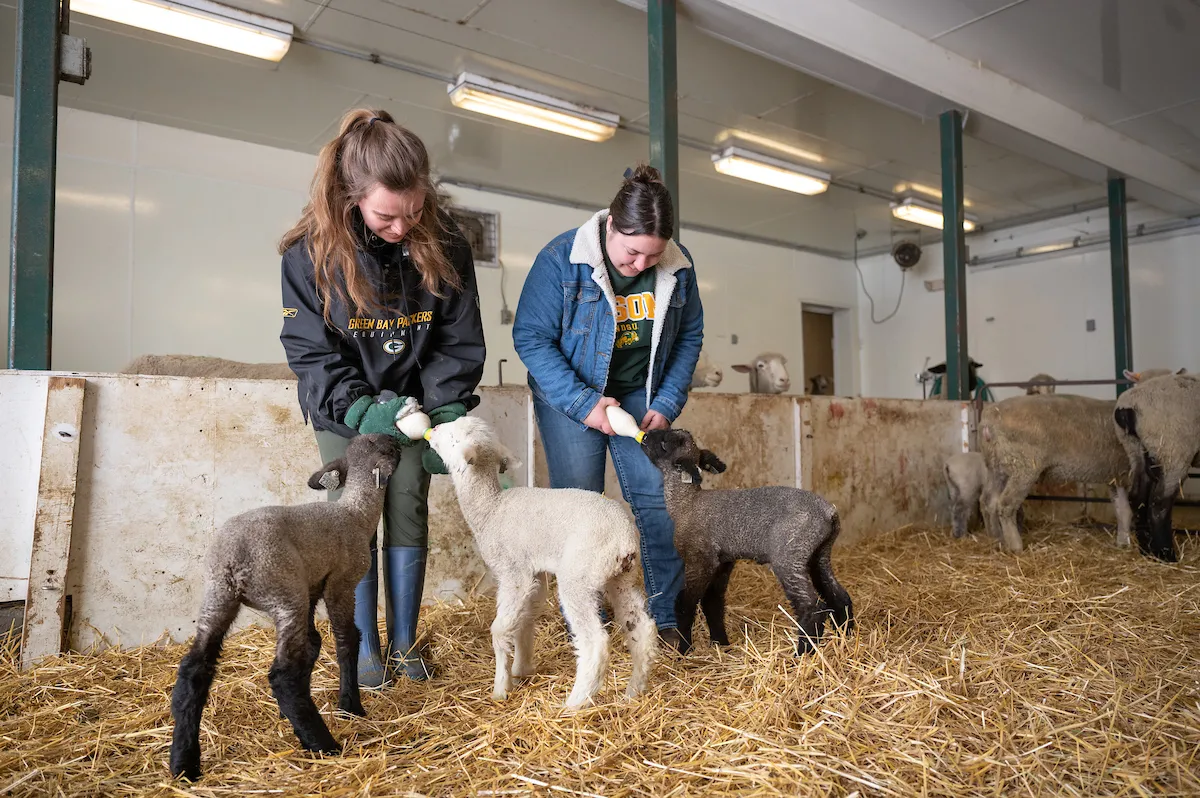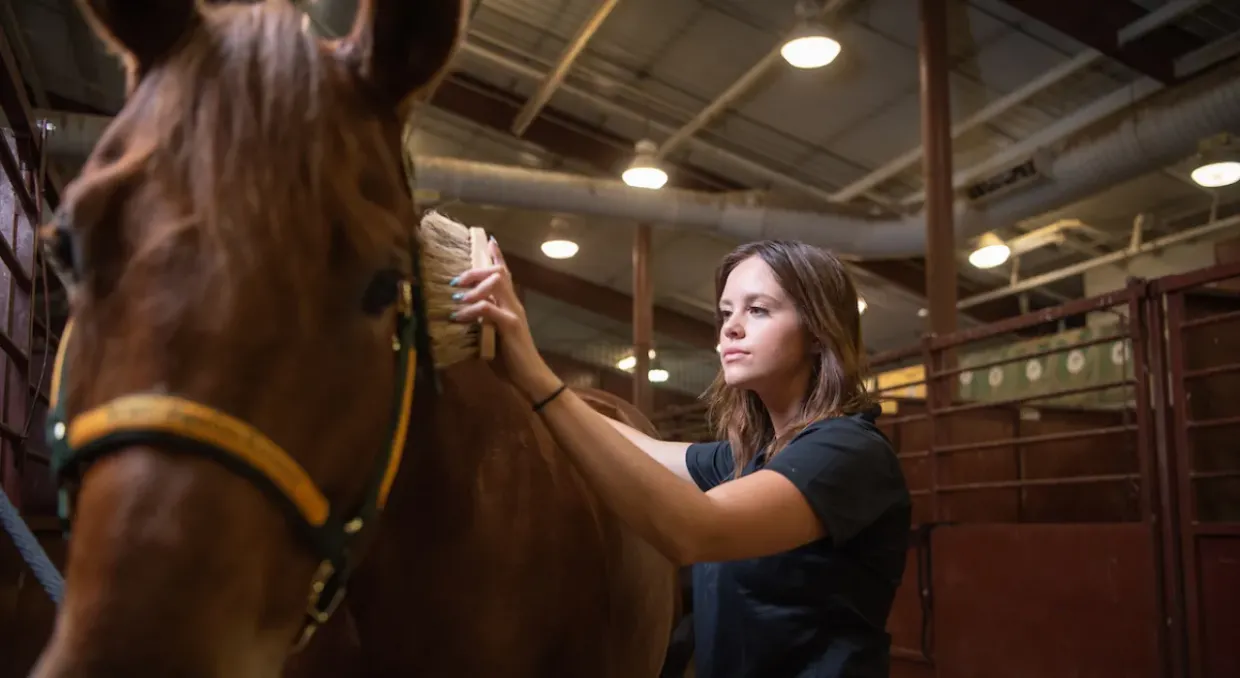Undergraduate Programs
Graduate Programs
Link under construction, please scroll down
The Animal Sciences undergraduate program offers students professional training designed to prepare them for careers in animal agriculture, animal agribusiness, animal health and allied industries, equine science, veterinary technology, and other related fields.
Our undergraduate curriculum emphasizes the application of biological and physical principles, as well as the social sciences associated with animal agribusiness. Majors, as well as minors, are available in Animal Science, Equine Science, and Veterinary Technology.
The Department of Animal Sciences offers advanced degree programs at the Master of Science and Doctor of Philosophy levels. Advanced degrees can be obtained with major emphasis in Animal Breeding, Meat Science, Nutrition, Nutritional Physiology, and Physiology of Reproduction.
UNDERGRADUATE PROGRAMS
The Animal Science major provides a strong overall background with supporting course work in the animal agriculture, sciences, humanities and general education. The curriculum can be tailored to focus on 1) production, management, and husbandry; 2) biomedical sciences, or 3) animal agribusiness. An Animal Science minor allows students to explore several animal-related courses and gain general animal industry knowledge.
Career Opportunities: Veterinary Medicine, Animal Health and Wellbeing, Agribusiness, Farm and ranch management, Livestock product sales, Public relations, Extension, Meat industry, Research, Sales and marketing, Land management
- Explore Major curriculum requirements
- Explore Minor curriculum requirements
Example Plans of Study by Option:
Production, Management and Husbandry
Biomedical Sciences
Animal Agribusiness
Meat Science Certificate
The Meat Science certificate program allows students to explore knowledge and skills related to production, preparation, and preservation of meat and meat products for human consumption.
- Explore Certificate curriculum requirements


The Equine Science program provides a well-rounded, science-based education encompassing both classroom and experiential learning opportunities. For individuals interested in pursuing their education beyond a Bachelor of Science degree, the Equine Science curriculum can be tailored to meet the requirements for veterinary schools and graduate programs.
The Equine Science major provides a strong overall background with supporting course work in the sciences, humanities and general education. An Equine Science minor allows students to explore several equine-related courses and gain general horse industry knowledge. Students completing their BS degree often have jobs in Equine Nutrition, Health Specialist, Facility and Events manager or Extension and Outreach specialist.
The Equine Science program has outstanding faculty members with diverse backgrounds in the equine industry who are ready to help students learn and thrive at NDSU. Our faculty have taught internationally, earned multiple teaching and advising awards, and maintain active research programs.
- Explore Major curriculum requirements
- Explore Minor curriculum requirements
Example plans of study by option:
Equine Production, Management, and Husbandry
Biomedical Science
Equine Assisted Services minor
This minor combines course works in equine management, human psychology and development, as well as the intersection of these fields. This 19-credit experiential learning program prepares you for impactful careers in therapeutic riding, human development and equine studies.
Explore minor curriculum requirements
NDSU's veterinary technology program will prepare you for an exciting career in animal health care. You'll learn technical nursing and laboratory skills, along with a broad understanding of animal health, disease, husbandry, clinical pathology, radiography, pharmacology, microbiology, anesthesiology and other disciplines. In addition to classroom learning, our program offers practical experiences including labs, clinical observations and a clinical externship.
Your academic career is planned to allow you to achieve your career goals and adapt to individual employment needs after you graduate. Our graduates can choose to pursue careers in many fields, including animal health care (including private practice), teaching, research, government and zoos. Our program is accredited by the American Veterinary Medical Association and is the only program in the United States that offers a minor in large animal veterinary technology. Students interact with companion animals, horses and livestock, as well as program veterinarians, veterinary technologists and animal health scientists. Students also have access to on-campus facilities like a small animal surgery suite, radiography room and darkroom, and a Veterinary Wellness Clinic.
- Explore Major curriculum requirements
Example plan of study:
Veterinary Technology
Large Animal Vet Tech Minor
- Explore Minor curriculum requirements
NDSU's master’s and doctoral degree programs in Animal Sciences are designed for students wanting to be leaders in agricultural business, livestock production, scientific innovation, and post-secondary education. Students can specialize in areas such as animal breeding, nutrition, genetics, health and stewardship, reproductive physiology, and meat science, with hands-on research experience that aligns with your unique interests.
The graduate-level programs are tailored to your goals, providing interdisciplinary approaches and personalized academic plans to meet the needs of each student. With access to cutting-edge facilities and mentorship from renowned faculty, you'll gain the specialized training needed to drive progress in the animal sciences field.
Prospective MS or PhD candidates are encouraged to contact Animal Sciences faculty members in their area of interest as potential advisors before submitting an application.
Specialized Training provided but not limited to:
-
Animal Health
-
Behavior & Welfare
-
Breeding & Molecular Genetics
-
Meats & Muscle Biology
-
Nutrition & Nutritional Physiology
-
Reproductive Physiology


